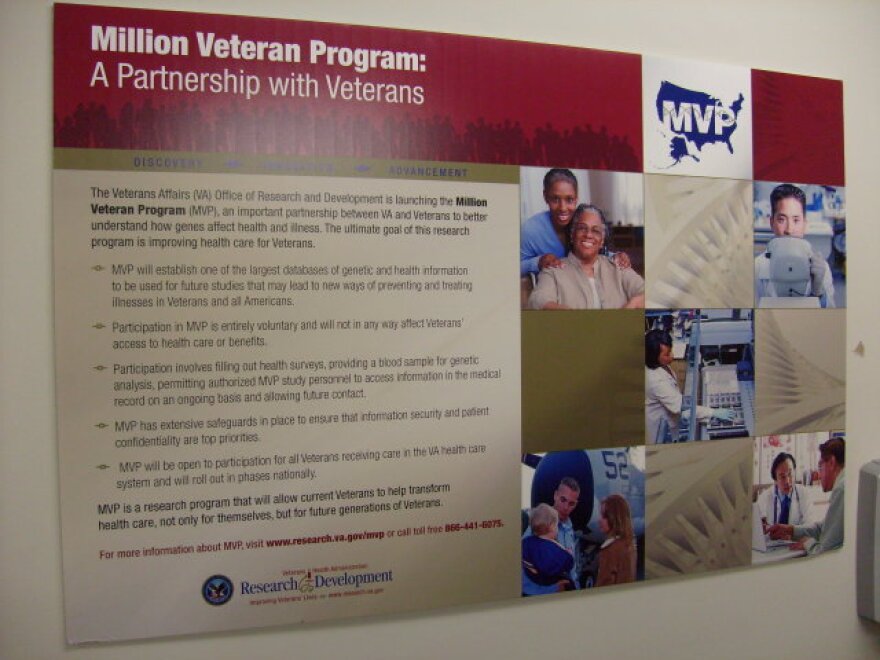The Milwaukee VA hospital is asking veterans to help build the world’s largest medical database. The effort is called the “Million Veteran Program”. Its goal is to collect blood samples and medical histories from a million vets nationwide, and eventually, make the information available to researchers. As WUWM’s Erin Toner reports, organizers hope the data leads to medical breakthroughs, including for ailments that afflict service men and women.
Eighty-four-year-old Richard Wargin served in the Navy in the 1940s. This morning, Wargin sits in a small windowless office at the Milwaukee VA while a research assistant sticks a needle into his arm. Wargin gets his regular medical care here, but by giving blood today, he’s doing something special. His sample, along with an extensive medical history, will become part of a massive bio-repository. Wargin made today’s appointment after receiving a letter about the Million Veteran Program - even though he does not grasp the science behind it.
“I don’t understand anything and my brain doesn’t work too good either, so don’t expect too much from me,” Wargin says.
However, Wargin says he knows it’s for a good cause.
Wargin represents the majority of vets enrolling, according to Research Assistant Tina Johnson. She says they’re simply volunteering to help others, just as many did when they stepped up to serve their country.
“They understand that it’s not something that is for them, that will benefit them and even our generation, but it’s something that will benefit generations to come,” Johnson says.

Johnson says since November, the Milwaukee hospital has signed up more than 1,000 – far more than most other VA facilities. She credits aggressive marketing and a very giving population.
“Some days it’s fast and furious. Word is beginning to spread, with our billboards and banners all over the VA. People are beginning to question, ‘Hey, what’s up here?”
What’s up…is quite ambitious and could play a major role in helping medical experts understand and treat diseases.
Dr. Jeffrey Whittle is coordinating Milwaukee’s Million Veteran Program. Whittle says the nationwide database could become the first ever to pair a large pool of individuals’ clinical information with their genetic material. So the collection could prove to be a gold mine for researchers looking for connections between DNA, family histories, lifestyles and environment.
“Hopefully once you see Gene A is associated with Disease B, then you can say, well, how come? And it may be, well, Gene A makes this protein. And it turns out that that protein is one we didn’t realize was associated with Disease B. And now we can say, well, if we can somehow stop that protein from doing what it’s doing, then we can prevent Disease B or we get a really, really good treatment for Disease B,” Whittle says.
Veterans are the selected population because they represent a large, diverse group of citizens. But Whittle says the project also wants to learn more about health conditions that impact former soldiers in particular, such as Post Traumatic Stress Disorder.
“PTSD likely has a genetic component. To the extent the VA has a lot of people who develop that condition and a lot of information about their care, their response to different treatments, it’s going to be especially useful for them. Agent Orange. Agent Orange is not of interest to you. But for the people who were in Vietnam and took baths in it, or virtually took baths in it, it’s of great interest,” Whittle says.
Whittle says while the potential for medical advancements is exciting, progress will be incremental.
“I think in 20 years, I will sort of say, ‘Gee, all of a sudden now I’m practicing genetic medicine,” Whittle says.
Back in the small Million Veterans Program office at the Milwaukee VA, a nurse taps on Mark Eisenreich’s arm, searching for a plump vein. Eisenreich served for more than a decade in the Navy as an intelligence clerk and military police officer. He says he’s giving blood today to help young vets returning from the Middle East, wounded.
“That’s all part of war. But the age, and the severity of the injuries, would, yeah, kind of surprise me. I think some of it is a little bit worse than what we saw during (Vietnam),” Eisenreich says.
VA officials say their top priority with the database process is privacy. All the blood samples and medical histories will remain anonymous, and access to them will be restricted to government and academic researchers. The VA intends to enroll veterans for the next five to seven years.




